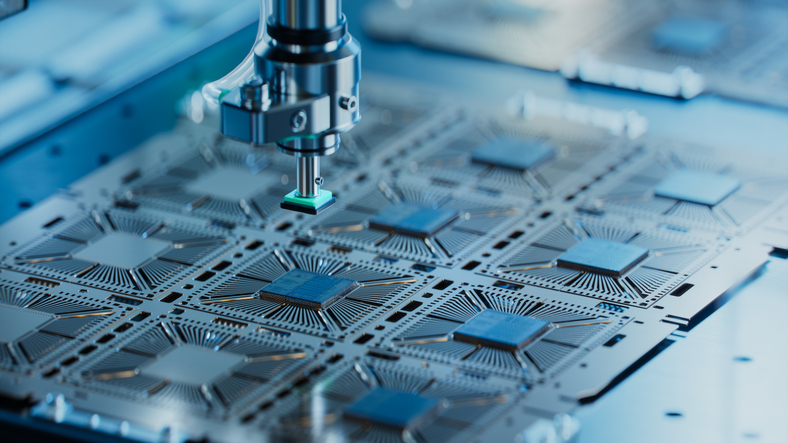Taiwan’s Gatekeeper: How TSMC Is Winning the AI Chip Arms Race
Taiwan Semiconductor Manufacturing Company (TSMC) once again proved its dominance in the global chip industry, reporting a 39% surge in quarterly profit to a record NT$452.3 billion (about US$14.8 billion) in Q3 2025. The record-breaking earnings were fueled by the explosive demand for artificial intelligence (AI) chips used by companies such as Nvidia, Apple, and AMD. According to Reuters, the company also raised its full-year revenue outlook, projecting growth in the “mid-30% range,” driven by the ongoing AI boom.
This growth underscores TSMC’s position not merely as a semiconductor manufacturer, but as the central pillar of the global AI supply chain, a company whose technological and geopolitical importance extends far beyond Taiwan’s borders.
Which country owns TSMC?
TSMC is based in Hsinchu, Taiwan, and remains one of the island’s most strategically vital corporations. Led by Chairman and CEO C. C. Wei, the company operates as a publicly traded firm on both the Taiwan Stock Exchange and the New York Stock Exchange. Its ownership is divided among institutional investors, foreign funds, and the Taiwanese government, which holds a small but symbolic stake.
The company’s unique status gives Taiwan a powerful position in global technology, especially as tensions between the U.S. and China intensify. CNBC reported that TSMC executives have repeatedly sought to reassure investors about China exposure, emphasizing that its client mix and operations remain globally diversified. To further mitigate geopolitical risks, TSMC continues to expand its fabrication plants (or “fabs”) abroad — including a major Arizona facility that will produce advanced 3 nm and 2 nm chips in coming years.
Which is bigger, TSMC or Nvidia?
While Nvidia dominates headlines as the face of the AI revolution, TSMC quietly powers it. Nvidia, valued higher in market capitalization at times, focuses primarily on chip design — it creates the blueprints for GPUs and AI accelerators — but it does not manufacture its own semiconductors.
TSMC, by contrast, is a pure-play foundry, fabricating chips for Nvidia, Apple, AMD, Qualcomm, and hundreds of other clients. As Yahoo Finance notes, TSMC’s manufacturing scale, yield rates, and technological depth make it irreplaceable in the semiconductor ecosystem. In short: Nvidia designs the future; TSMC builds it.
Who is the largest chipmaker in the world?
The answer depends on how “largest” is defined.
By total revenue, Nvidia now sits among the top semiconductor firms, riding record AI hardware demand. However, in the category of foundry production—the actual manufacturing of chips—TSMC is unmatched. According to Statista, TSMC controls more than 60% of the global foundry market, and its share climbs even higher in cutting-edge process nodes like 3 nm technology.
Competitors such as Samsung Foundry and Intel Foundry Services trail significantly in both volume and technological sophistication. As The Financial Times reported, TSMC’s advanced fabrication capacity has become the cornerstone of modern computing — from smartphones and autonomous vehicles to supercomputers powering generative AI.
Why is TSMC No. 1 in chips?
Several factors explain TSMC’s unmatched position in the semiconductor world.
Technological Leadership
TSMC has consistently led the race in process technology, moving from 5 nm to 3 nm, and preparing for mass production of 2 nm chips by 2026. TrendForce notes that roughly three-quarters of TSMC’s Q3 2025 wafer revenue came from 7 nm or smaller nodes — a sign of its stronghold on advanced chip production.
Scale and Efficiency
Its immense production scale gives it superior cost efficiency and yield performance. Few competitors can match TSMC’s ability to simultaneously deliver volume, quality, and advanced design compatibility.
Deep Client Relationships
Over three decades, TSMC has built deep trust with tech giants like Apple and Nvidia. Switching foundries would mean massive technical risks and financial costs, creating a high barrier to exit for clients.
Heavy Investment
According to Reuters, TSMC expects capital expenditures of up to US$42 billion in 2025, largely to expand AI-related manufacturing and global capacity. This includes the company’s Arizona gigafab, where it plans to produce both 3 nm and 2 nm chips.
Profitability and Margins
As reported by TrendForce, TSMC achieved a gross margin of 59.5% and an operating margin above 50% in Q3 2025. These are extraordinary figures for a company of its size — reflecting efficiency, technological lead, and strong pricing power.
The AI Race and What’s Next
The AI chip race has transformed from a design contest into a manufacturing arms race. According to CNBC, more than half of TSMC’s revenue now comes from high-performance computing (HPC) — the segment driving AI, data centers, and cloud infrastructure.
But the company faces headwinds. Rising U.S.–China trade tensions threaten supply stability, while export controls on advanced chip equipment could complicate manufacturing. Meanwhile, Samsung and Intel are accelerating their foundry ambitions to narrow the gap.
Still, TSMC’s leadership remains unchallenged. As The Financial Times observed, its control of leading-edge chip production effectively positions Taiwan as the epicenter of global AI infrastructure — a “silicon shield” that protects both the company and, geopolitically, the island itself.
In essence, the battle for AI supremacy is not just about smarter algorithms but about who can build them faster, smaller, and at scale. And in that race, TSMC stands as the indispensable manufacturer of the modern world.













